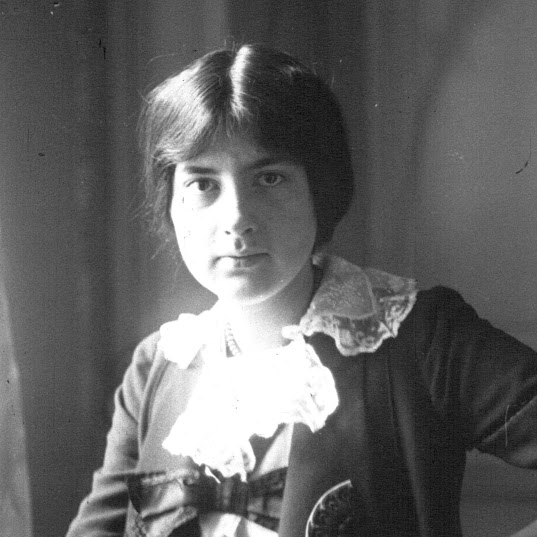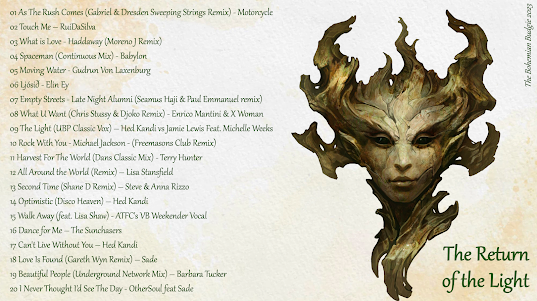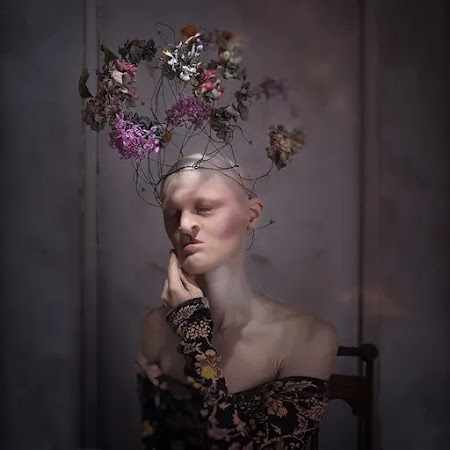I recently read Joris-Karl Huysmans wonderfully decadent, extravagant masterpiece Against Nature (or, Against the Grain, translated from A Rebours), which has some of the most opulent Bohemian prose I have ever encountered. Although it is likely not a book suited to everyone's taste, it imparts a darkly enervated, droll aesthetic which is only paralleled by the crooked imaginings of Poe, and so is most at home on these pages. In the same week, and quite unconnectedly, I discovered that Alfred Hitchcock partnered with Salvador Dali in his 1945 film Spellbound, as artist and set designer in the film's psychoanalytic dream sequence.* For some reason, these two cultural phenomena have become linked in my mind, and I present below scenes from Dali's dream sequence, and paragraphs from Against Nature; a section where the reclusive anti-hero Des Esseintes over-indulges his latest obsession in exotic plants...
"Last of all, when he had sufficiently savoured the sight, he hurriedly scattered about exotic perfumes, exhausted his vaporizers, concentrated his strongest essences, gave the rein to all his balms, and lo! the stifling closeness of the room was filled with an atmosphere, maddening and sublime, breathing powerful influences, impregnating with raging alcoholates an artificial breeze,--an atmosphere unnatural, yet delightful, paradoxical in its union of the allspice of the Tropics, the pungent savours of the sandalwood of China and the hediosmia of Japan with native odours of jasmine, hawthorn and vervain, forcing, to grow together, in despite of seasons and climates, trees of diverse essences, flowers of colours and fragrances the most opposite, creating by the blending and shock of all these tones one common perfume, unknown, unforeseen, extraordinary, wherein re-appeared at intervals as a persistent refrain, the decorative phrase of the opening, the odour of the broad meadows breathed over by the lilacs and the lindens.
Suddenly a sharp agony assailed him; it felt as though a centre-bit were boring into his temples. He opened his eyes, to find himself once more in the middle of his study, seated before his working table; he got up and walked painfully, half-stunned, to the window, which he threw part open. A current of fresh air sweetened the stifling atmosphere that enveloped him; he marched up and down the room to recover the proper use of his limbs, going to and fro, his eyes fixed on the ceiling on which crabs and seaweed powdered with sea salt stood out in relief from a grained background, yellow as the sand of a beach. A similar design decorated the plinths bordering the panels, which in their turn were covered with Japanese crape, a watery green in colour and slightly waved to imitate the ripple of a wind-blown river, while down the gentle current floated a rose leaf round which frolicked a swarm of little fishes dashed in with two strokes of the pen.
But his eyes were still heavy; he left off pacing the short length of floor between the font and the bath and leant his elbows on the window sill. Presently his dizziness ceased, and after carefully recorking the bottles of scents and essences, he seized the opportunity to tidy his apparatus for making up the face,--his paints and powders and the like. He had not touched these things since his arrival at Fontenay, and he was almost astonished now at the sight of this collection once visited by so many women. One on top of the other, phials and porcelain pots littered the table confusion.
Here was a china box, of the green sort, containing schnouda, that marvellous white cream which, once spread on the cheeks, changes under the influence of the air to a tender pink, then to a scarlet so natural that it gives an absolutely convincing illusion of a complexion mantling with red blood; there, jars incrusted with mother-o'-pearl held Japanese gold and Athens green, coloured like the wing of the cantharides beetle, golds and greens that blend into a deep purple directly they are moistened; beside pots full of filbert paste, of serkis of the harem, of emulsions of Cashmere lilies, of lotions of strawberry and elderfiower for the skin, beside little phials of solutions of India-ink and rose-water for the eyes, lay a host of different instruments, of mother-o'-pearl, of ivory and of silver, mixed up with dainty brushes for the teeth and gums,--pincers, scissors, strigils, stumps, crimpers, powder-puffs, back-scratchers, patches and files. He handled all this elaborate apparatus, bought in former days to please a mistress who found an ineffable pleasure in certain aromatics and certain balms, an ill-balanced, nerve-ridden woman, who loved to have her nipples macerated in scents, but who only really experienced a genuine and over-mastering ecstasy when her head was tickled with a comb and she could, in the act of being caressed by a lover, breathe the smell of chimney soot, of wet plaster from a house building in rainy weather, or of dust churned up by the heavy thunder drops of a summer storm."
* Interestingly, these eyeball scenes are similar to the
Eyes from Metropolis, by Fritz Lang (1927) and I wonder if Dali was influenced by this technique. I say 'wonder' because with any other artist I would be certain it was an act of plagiarism, but Dali was such a creative force that I expect he could quite independently come up with such an idea.



.jpg)
.jpg)














































